中国公证制度介绍
中国的公证制度英

在公证过程中,公证员还需向当事人提供法 律咨询,并在必要时协助调解纠纷。
对于实习公证员或新任公证员,资深公证员 或公证机构负责人需对其工作进行监督与指 导。
05
公证的法律责任与监督
公证的法律责任
公证员责任
公证员在执业过程中,应当遵守职业道德和执业规范,尽到合理的谨慎义务,对 公证事项的真实性、合法性等进行审查,并依法承担相应的法律责任。
中国的公证制度
xx年xx月xx日
contents
目录
• 公证制度概述 • 公证业务范围 • 公证程序与规则 • 公证员的资质与职责 • 公证的法律责任与监督 • 中国公证制度的发展趋势与展望
01
公证制度概述
公证制度的起源与发展
公证制度的起源
公证制度起源于古罗马的“tabulae publicae”,最初是为了满足公众对法 律服务的需求而设立。在中国,公证制度 的发展历程可以追溯到清朝末期的“洋务 运动”时期,当时一些西方列强为了保护 其在华利益,开始在中国设立公证机构。
中国公证制度在国际交流中的角色与影响
提升国际影响力
通过参与国际交流活动,提升 中国公证制度在国际上的影响
力。
学习借鉴先进经验
通过与国际同行进行交流,学习 借鉴先进经验和做法,推动中国 公证制度的不断完善和发展。
促进国际合作
加强与国际公证行业的合作,共同 推动公证事业的发展。
THANKS
谢谢您的观看
公证书的内容应当客观、真实、准确,包括公证事项的描述、证 据材料的列举、结论的作出等。
发证程序
在制作好公证书后,公证机构应当及时向当事人发放公证书,并 告知其领取方式和注意事项。
04
公证员的资质与职责
中国委托公证人制度

中国委托公证人制度
中国委托公证人制度是指在中国法律体系内,为了保障公民和法人的合法权益,依法设立的委托公证人机构。
该制度的建立旨在加强对公证活动的监管,规范公证人的行为,保证公证活动的公正、合法和有效性。
委托公证人是经过严格考试和资格认证的专业人员,他们具有法律知识、职业道德和公证技能等方面的专业素质。
委托公证人按照法律规定,可以为公民、法人和其他组织提供多种类型的公证服务,如证明公民身份、财产权益、遗嘱、委托代理等。
同时,他们还可以在司法机关或行政机关的指导下,执行司法公证和行政公证的任务。
中国委托公证人制度的实施,标志着中国公证事业的进一步规范化和专业化。
它不仅提高了公证服务的质量和效率,还有利于维护公民和法人的合法权益,维护社会稳定和公正正义。
随着我国经济社会的不断发展和人民生活水平的提高,公证机构和公证服务的需求将不断增加,委托公证人制度的完善和规范将成为未来发展的重要方向。
关于公证制度的法律规定(3篇)

第1篇一、公证制度概述公证制度是国家法律制度的重要组成部分,是指国家公证机构依法对民事法律行为、有法律意义的事实和文书进行证明,以保障法律行为的真实性、合法性和有效性的一种法律制度。
公证制度具有证明、服务、监督和保护等多种功能,对于维护社会稳定、促进经济发展、保障公民合法权益具有重要意义。
二、公证法的基本原则1. 公正、独立原则:公证机构在办理公证事务时,必须坚持公正、独立,不受任何单位和个人干涉。
2. 依法办理原则:公证机构办理公证事务,必须依照法律规定,严格审查,确保公证事项的真实性、合法性和有效性。
3. 便民、高效原则:公证机构在办理公证事务时,应当便民、高效,为当事人提供优质服务。
4. 保密原则:公证机构对公证事项和当事人的隐私应当保密。
三、公证机构与公证员1. 公证机构:公证机构是依法设立的专门从事公证业务的机构,负责办理公证事务。
我国公证机构分为国家公证机构和地方公证机构。
2. 公证员:公证员是公证机构的专职工作人员,负责办理公证事务。
公证员应当具备下列条件:(1)具有中华人民共和国国籍;(2)年满25周岁;(3)品行良好,具有完全民事行为能力;(4)具有法律专业知识;(5)通过国家司法考试;(6)在公证机构实习2年以上或者具有3年以上其他法律职业经历并在公证机构实习1年以上,经考核合格。
四、公证业务的范围公证业务范围主要包括:1. 民事法律行为公证:包括合同、继承、赠与、遗嘱、委托、声明、保证等公证事项。
2. 有法律意义的事实公证:包括出生、死亡、婚姻、学历、学位、职务、职称、经历、亲属关系、收养、财产分割等公证事项。
3. 文书公证:包括公司章程、董事会决议、股东会决议、董事会决定、监事会决定、审计报告、资产评估报告等公证事项。
4. 其他公证业务:根据法律、法规的规定,公证机构可以办理其他公证业务。
五、公证程序的规则1. 申请公证:当事人应当向公证机构提出公证申请,并提交相关证明材料。
第八章 公证制度
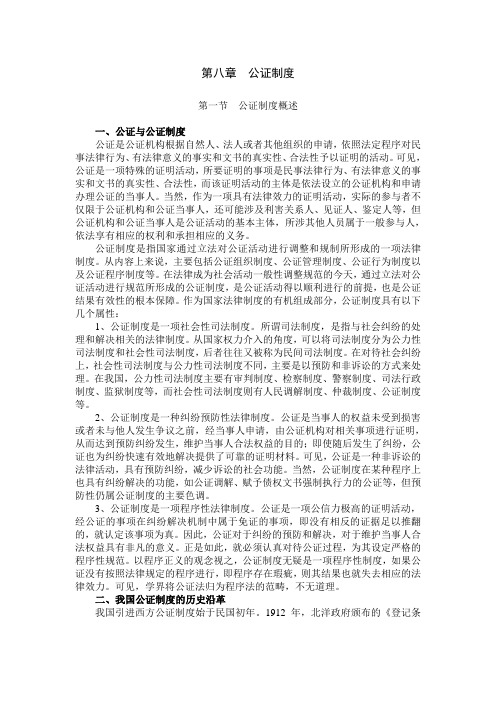
第八章公证制度第一节公证制度概述一、公证与公证制度公证是公证机构根据自然人、法人或者其他组织的申请,依照法定程序对民事法律行为、有法律意义的事实和文书的真实性、合法性予以证明的活动。
可见,公证是一项特殊的证明活动,所要证明的事项是民事法律行为、有法律意义的事实和文书的真实性、合法性,而该证明活动的主体是依法设立的公证机构和申请办理公证的当事人。
当然,作为一项具有法律效力的证明活动,实际的参与者不仅限于公证机构和公证当事人,还可能涉及利害关系人、见证人、鉴定人等,但公证机构和公证当事人是公证活动的基本主体,所涉其他人员属于一般参与人,依法享有相应的权利和承担相应的义务。
公证制度是指国家通过立法对公证活动进行调整和规制所形成的一项法律制度。
从内容上来说,主要包括公证组织制度、公证管理制度、公证行为制度以及公证程序制度等。
在法律成为社会活动一般性调整规范的今天,通过立法对公证活动进行规范所形成的公证制度,是公证活动得以顺利进行的前提,也是公证结果有效性的根本保障。
作为国家法律制度的有机组成部分,公证制度具有以下几个属性:1、公证制度是一项社会性司法制度。
所谓司法制度,是指与社会纠纷的处理和解决相关的法律制度。
从国家权力介入的角度,可以将司法制度分为公力性司法制度和社会性司法制度,后者往往又被称为民间司法制度。
在对待社会纠纷上,社会性司法制度与公力性司法制度不同,主要是以预防和非诉讼的方式来处理。
在我国,公力性司法制度主要有审判制度、检察制度、警察制度、司法行政制度、监狱制度等,而社会性司法制度则有人民调解制度、仲裁制度、公证制度等。
2、公证制度是一种纠纷预防性法律制度。
公证是当事人的权益未受到损害或者未与他人发生争议之前,经当事人申请,由公证机构对相关事项进行证明,从而达到预防纠纷发生,维护当事人合法权益的目的;即使随后发生了纠纷,公证也为纠纷快速有效地解决提供了可靠的证明材料。
可见,公证是一种非诉讼的法律活动,具有预防纠纷,减少诉讼的社会功能。
公证制度指的是什么?
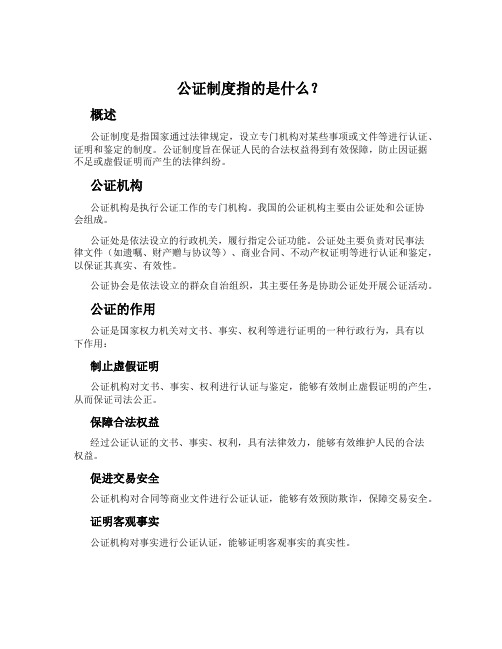
公证制度指的是什么?概述公证制度是指国家通过法律规定,设立专门机构对某些事项或文件等进行认证、证明和鉴定的制度。
公证制度旨在保证人民的合法权益得到有效保障,防止因证据不足或虚假证明而产生的法律纠纷。
公证机构公证机构是执行公证工作的专门机构。
我国的公证机构主要由公证处和公证协会组成。
公证处是依法设立的行政机关,履行指定公证功能。
公证处主要负责对民事法律文件(如遗嘱、财产赠与协议等)、商业合同、不动产权证明等进行认证和鉴定,以保证其真实、有效性。
公证协会是依法设立的群众自治组织,其主要任务是协助公证处开展公证活动。
公证的作用公证是国家权力机关对文书、事实、权利等进行证明的一种行政行为,具有以下作用:制止虚假证明公证机构对文书、事实、权利进行认证与鉴定,能够有效制止虚假证明的产生,从而保证司法公正。
保障合法权益经过公证认证的文书、事实、权利,具有法律效力,能够有效维护人民的合法权益。
促进交易安全公证机构对合同等商业文件进行公证认证,能够有效预防欺诈,保障交易安全。
证明客观事实公证机构对事实进行公证认证,能够证明客观事实的真实性。
公证的范围公证范围是指公证机构执行公证的种类和范围。
我国公证的范围包括:不动产权证明公证机构应当在其辖区内办理不动产权证明公证。
不动产交易相关的各种文件,也可以经过公证机构的认证鉴定,以保证其真实有效。
遗嘱认证公证机构应当在被认证人的户籍所在地或其居住地办理遗嘱认证公证。
遗嘱是依法设立的文书,经过公证认证后才具有法律效力。
合同公证公证机构应当对所在辖区内的各种合同、协议等文件进行公证认证。
名称预先核准公证机构应当对企业名称、商标名称、域名等进行预先核准公证。
预先核准能够有效避免重名等问题。
公证制度的重要性公证制度是国家认证机构依法保障人民权利的一项基础性制度安排。
公证制度能够保证实现公证的科学规范,确保有效性和现实操作的可行性。
同时,公证制度还能够制止数据造假、虚假证明等不良行为,维护社会公序良俗。
公证制度讲解

公证制度讲解随着现代社会的发展,公证制度作为一种有效的法律工具,广泛应用于各个领域。
公证制度的要义在于确认特定行为的真实性和合法性,并为其提供法律保护。
本文将就公证制度的定义、目的、原则以及公证的程序等方面进行详细的讲解。
一、公证制度的定义公证制度,简而言之,是指为了保证身份、行为、事实等的真实性和合法性,由具备公证员资格的公证机构办理并制作相关证明的一项法律制度。
公证制度主要由国家成立的公证机构来负责实施和管理,公证机构的权威性与正式性保障了公证制度的有效性。
二、公证制度的目的公证制度的目的在于保护个人和法律主体的利益,以及维护社会秩序和公平正义。
通过公证,能够确保特定行为的真实和合法性,为公民、法人和其他组织在法律上的权益提供有力的证明和保护。
公证制度还能增加行为的可靠性和稳定性,促进社会公证事务的规范化和标准化运作。
三、公证制度的原则1.真实性原则:公证制度以保证行为的真实性为核心原则。
公证员在办理公证事务时,要求被公证人提供真实、准确的相关材料和信息,并对其进行审查和核实。
只有在确认行为的真实性后,才能办理公证。
2.公正原则:公证制度以公正、公平的原则来保障各方利益。
公证员应秉持中立立场,在办理公证事务时不能偏袒任何一方,并要遵守法律规定的程序和要求,不得违背道德和职业操守。
3.合法性原则:公证制度必须遵循法律的规定和法定程序。
公证员在办理公证事务时,要根据相关法律法规的要求进行操作,确保行为的合法性,不得超越法律的权限。
四、公证的程序公证的程序主要包括申请、审查、登记、传达、归档等环节。
1.申请:申请人应向公证机构提交公证申请书,并提供相关材料和证明。
2.审查:公证机构对申请材料进行审查,核实申请人身份和事实情况。
3.登记:经过审查后,公证机构将申请事项登记并告知申请人,约定公证时间和地点。
4.传达:在公证过程中,公证员将了解当事人的真实意思,并记录在案,同时编制公证书。
5.归档:公证书成文后,公证机构会对其进行归档备案,以备后续查询和证明使用。
中国公证制度介绍

中国公证制度介绍引言公证是指有关国家机关或者授权的公证机构的公证员根据当事人的申请或者法律的规定,对有关事实或者法律文件的真实性、合法性、有效性、完整性进行证明的活动。
目前,中国已经建立了比较完善的公证制度,并在实践中发挥着重要的作用。
中国公证制度的历史背景中国的公证制度可以追溯到汉唐时期,当时的公证主要是由地方官员或者有关机构进行。
但是,公证的形式和内容都比较简单,而且常常受到地方官员的干扰,缺乏统一的管理和监督。
直到清代,才在《大清律》中正式对公证制度进行了规定。
1949年新中国成立后,公证工作在不断完善和发展,先后建立了民主法制公证、工商登记公证、房产证明公证、涉外公证等多个公证领域,并逐步形成了比较完善的公证制度。
中国公证制度的组织结构中国的公证制度主要由国务院司法行政部门负责领导和管理,各地也设有公证行政机构,这些机构授权有关公证机构进行公证活动。
公证活动主要由公证处、公证员完成,同时还有公证协会对公证行为进行指导和规范。
中国公证制度的主要内容公证的范围中国的公证活动范围比较广泛,主要包括:1.证明当事人身份和权利;2.证明法律文书的真实性;3.证明事实;4.证明自然人、法人或者其他组织的权利。
公证的程序中国公证的程序经过了反复修订和完善,目前主要包括以下环节:1.公证申请:当事人向公证机构申请公证;2.公证受理:公证机构对公证申请进行审核和受理;3.公证调查:公证员对相关事实进行调查、询问和勘验;4.公证确认:公证员对相关事实和证据进行确认;5.公证书据:公证员根据实际情况制作公证书;6.公证送达:公证书送达给当事人或者相关单位。
公证的效力中国公证的效力主要表现在以下方面:1.公证书可以作为法律文书证据使用;2.执行公证书可以起到强制执行的作用;3.公证书可以起到防止当事人撤回和变更的作用;4.公证书可以起到防治欺诈和虚假宣传的作用。
中国公证制度的作用和意义中国的公证制度在现代法治社会中发挥着越来越重要的作用,主要表现在以下方面:1.保障当事人的合法权益;2.维护社会公正和稳定;3.促进经济和社会发展;4.增强社会信用和公信力;5.增强国际合作和交流的信任和合作关系。
中国的公证制度介绍

中国的公证制度介绍前言公证是指以法律为基础,由公证员对涉及法律事实或法律行为的真实性、合法性进行认证的行为。
公证制度被认为是维护社会公正、促进社会和谐的一项重要制度。
中国的公证制度起源于清朝时期,经历了近两个世纪的演进和完善。
本文将介绍中国的公证制度的基本情况、主要法律法规、公证业务范围和办事程序等方面的情况。
基本情况中国的公证制度主要由三部分组成:公证机关、公证员和公证业务。
公证机关是指按照法定程序设立的为办理公证业务服务的机构,目前中国共有3000多家公证机关。
公证员是指经过国家公证员资格考试并获得国家公证员证书的公职人员,具有独立行使公证职权的权利和义务。
公证业务是指公证机关和公证员从事的公证活动,主要包括证明文件的公证、委托代理人的公证、不动产的公证、涉外证明的公证等。
主要法律法规中国公证制度的法律法规主要包括《中华人民共和国公证法》和《中华人民共和国公证条例》。
其中,《公证法》规定了公证制度的基本原则,明确了公证机关的设立条件、公证员的资格条件和任职程序、公证业务的办理程序、公证费用的标准等方面的内容。
《公证条例》则更加详细地规定了公证机关和公证员的职责、权限和管理制度。
公证业务范围中国的公证业务范围非常广泛,主要包括以下几个方面:证明文件的公证公证机关可以对与公证事项有关的证明文件进行公证。
例如,婚姻证明、出生证明、收入证明和学历证明等。
委托代理人的公证委托代理人可以通过公证机关的公证认证自己的代理权。
例如,在房屋买卖中,买方可以委托代理人代表自己进行房屋交易,在公证机关办理委托代理人的公证后,代理人就可以正式代表买方进行交易。
不动产的公证不动产的公证包括不动产权属证明、不动产抵押权证明、不动产租赁权证明等。
涉外证明的公证涉外证明的公证是指涉及中国公民或中国法人在海外的法律事项,例如与海外企业签订合同、在海外购房、在海外求学等。
办事程序办理公证业务的程序大致如下:1.准备资料申请公证之前,需准备好证明文件、有效身份证件等相关资料。
中国的公证制度英

国翻译文中国的公证制度公证制度是指国家建立机构,对公民、法人和其他组织依法做出的书面证明及背书行为进行证明的法制机制。
在中国,公证制度主要是指由专业的公证机构局进行的公证工作,以保证预防和解决涉及民事、商事、行政等领域中出现的纠纷和问题。
公证机构中国的公证工作由公证机构进行。
公证机构在法律上属于行政机关,由司法机关实行管理。
公证机构独立的执业经营地位包括公证员的人事选择、薪酬待遇等方面。
因此,公证机构享有不同于司法机关的独立地位和公证职能。
这样的体制给了公证工作更高的独立性和公正性。
目前,在全国各省市区和大部分县级行政区,都设有公证机构。
公证员是公证机构的核心,公证员由司法部聘任,执业期限为5年。
公证员需要经过相关考试并取得公证员资格证书后才能上岗。
公证员的核心职责是负责对各类法律文书进行公证,并对被公证事项的真实性、合法性、规范性、完整性进行审查。
公证员一般具有法律、公证、会计等专业背景并具备良好的文化素养和职业道德。
公证机构的服务对象主要包括公民、法人和其他组织。
公民可以通过公证机构进行婚姻、产权、车辆转移、遗嘱等方面的公证;法人和其他组织可以通过公证机构进行合同、章程、授权委托书等方面的公证。
公证流程公证流程包括公证申请、公证受理、公证费用、公证真实性审查、公证书的签发和公证书的存留等步骤。
公证申请人需要携带身份证明和相关证明材料到公证机构进行申请。
公证机构将核实申请人的身份和材料真实性,并确认公证申请的合法性。
如果申请人所提供的材料不够完整或存在问题,公证机构将要求其补充材料或者修正错误。
当公证机构确认申请人的申请无误后,公证工作正式开始。
公证员需要对申请人提供的证明材料进行审查,确保其真实性和合法性。
如果需要采取证据保全措施,公证机构将会按照相关要求来进行处理。
公证费用是公证机构服务的一部分,一般根据不同的公证服务项目进行定价。
公证费用由申请人支付,公证机构需要根据价值确定费用的标准。
公证制度

综上所述,在中国确立法定公证原则是公证自身的性质决定的,法定公证作为一种制度应在公证法中确立下 来,但其具体事项应规定在相关的民商实体法中,不宜在公证法中作具体规定。
具体事项
具体事项
公证制度此问题同样也存在肯定说和否定说两种观点。肯定说认为,在即将出台的《公证法》中应规定法定 公证的条款,其中写明法定公证的事项④。其理由是:
法定公证
法定公证
在中国是否应确立法定公证问题,在学界和公证实务界存在两种截然相反的观点,即否定说和赞成说,两种 观点似乎都很有道理,都有充足的理由。
公证制度否定说认为,法定公证即必须公证,它与公证机构的社会中介组织性质和社主义市场经济的发展要 求是不相适应的,在立法上存在着障碍。其理由是:
(1)作为市场中介机构的公证机构,既是市场经济的法律服务者,又是市场经营活动的直接参与者。公证 服务的有偿性显属交易作为,公证机构与公证相对人之间的法律关系当然是契约关系。确立必须公证制度,从根 本上有违自愿的原则,剥夺当事人对服务贸易的公平交易权和选择权,有“强制交易”、“强制消费”之嫌。
公证的作用
公证的作用
公证制度公证是国家为保证法律的正确实施,稳定社会经济民事流转秩序,预防纠纷,减少诉讼,保护公民、 法人和其他组织的合法权益而设立的一项预防性的司法证明制度,是中国司法制度的重要组成部分。公证作为一 项非诉讼手段,在经济活动和社会生活中,有着无可替代的作用。然而,现实生活中,公证的社会认知度较低, 有些人甚至对公证产生错误的认识,使公证的职能不能充分发挥。为使公证得到健康发展,有人提出在中国公证 立法中应确立法定公证的规定。围绕此问题,学界和公证实务界展开了激烈的讨论,学界多从市场经济本身的需 要阐述,公证服务应当是自愿的;公证实务界的同志多从发挥公证的职能上论证,确立法定公证的必要性。拟从 法定公证的涵义、中国立法中是否应确立法定公证制度、以及如何确立法定公证制度等问题略抒己见,以期抛砖 引玉,共同研究、探讨此问题。
中国的公证制度

中国的公证制度公证,是指公证机关对当事人的意思表示或者事实进行的确认,具有证明力的法律行为。
公证制度被广泛应用于各种领域,例如房地产交易、民事诉讼、商业交易等等领域。
在中国,公证制度的历史可以追溯到清朝,但现代公证制度的基础则是在中华人民共和国成立后建立的。
本文将介绍中国的公证制度的概述和主要内容。
公证机关公证机关是一种特殊的公共服务机构,由政府设立并受政府监管。
根据《中华人民共和国公证法》的规定,公证机关必须具备独立性、中立性、公正性、保密性和责任制,并且承担着公证活动的主要责任。
公证机关分为国家公证机关和地方公证机关两种类型。
其中,国家公证机关包括全国公证机构和省级公证机构,地方公证机关则包括市(区)公证机构和县(市、区)公证机构。
公证范围公证范围指公证机关在工作时所涉及的内容范围。
在中国,公证机关承担着广泛的公证业务。
除了一般的公证活动,例如公证证明、公证存证、公证代理等等工作,其还包括具有特殊性质的公证业务,例如涉外公证、电子公证、金融公证、不动产公证等等。
公证机关的确需对不同的公证业务进行不同的处理,保障公证业务的有效性和公信力。
公证程序公证程序是公证机关办理公证业务时必须遵循的一套流程。
在中国,公证程序一般包括以下五个步骤:1.承诺公证:当事人提出公证申请后,公证机关先进行承诺公证,即告诉当事人公证机关将会对其办理何种公证业务,何时进行公证,以及对公证所需费用等等事项进行解释。
2.审核认证:审核认证是公证机关对当事人的公证材料和身份进行审核核实的阶段。
公证机关必须认真对待每一份材料,对其真实性和合法性进行仔细的审查。
3.现场公证:现场公证是公证机关对当事人的证明材料和身份进行确认的阶段。
公证机关会通过对当事人的身份证明进行比对,确认其身份的真实性。
4.制证送达:制证送达是公证机关将公证证明送达给当事人的阶段。
公证机关制作公证证明后,将其邮寄或者面交给当事人。
5.存档备查:存档备查是公证机关对公证证明进行存档的阶段。
中国公证制度介绍

中国公证制度介绍什么是公证?公证是公证员在法定程序下,对民事法律行为、事实和文书证明等进行证实的一种行为。
公证员要对被公证人身份、意思表示等进行核实,并在公证书上附加签章。
公证书具有证明力和强制执行力,属于法律规定的法律文书之一。
中国的公证制度在中国,公证制度是指由公证机构通过公证活动,对涉及民事法律行为、事实和文书证明的事项进行证明和鉴定的制度。
公证机构是指由人民政府授权的开展公证业务的机构。
公证员是指经过国家考试拥有公证执业资格的专职从业人员。
中国的公证制度始于20世纪50年代。
1955年,中国人民政治协商会议第三届全体会议通过了《关于创办公证事业的建议》,提出了开展公证事业的建议。
1956年,中央政府批准了《公证条例》。
随后,各级政府成立了公证机构和公证员队伍。
公证的种类中国公证制度根据不同的证明需要,将公证分为以下几种类型:行为公证行为公证是对民事法律行为的证明,包括出生、死亡、婚姻、离婚、收养、监护、继承、业主委员会成立、财产转让和抵押等公证。
事实公证事实公证是对事实情况的证明,包括追索、行使债权、损失赔偿、人身安全、产权确认以及财产保全等公证。
文书公证文书公证是对与民事、经济、社会生活有关的各种文书的真实性或者无抵押情况的证明,包括合同、承诺书、夫妻协议、遗嘱、遗产分割协议等公证。
网络公证网络公证是利用电子合同、数字签名等技术进行的公证活动。
已经在中国法律制度中普遍采用。
公证的作用公证的作用主要是保障民事法律行为的安全和权益的得到尊重。
公证可以增强民众的信任,促进社会公正和法制建设。
公证的作用主要表现在以下几个方面:法律公证效力公证书在法律上具有证明力和强制执行力。
在民事诉讼中,公证可以作为证据使用。
有效维护民事权益公证能够有效保护民事权益,消除民事争议,防止违法行为。
增强社会信任公证可以增强社会信任,提高市民对公共事务和司法机构的信任度,促进社会和谐稳定。
公证的发展趋势随着数字化、网络化和信息化的不断发展,中国公证制度也在发生着变革。
中国司法制度公证制度汇编

必须招标的工程项目: (1)大型基础设施、公共事业等关系社会公共利益、公共安全的项目; (2)全部或者部分使用国有资金或国家融资的项目; (3)使用境外贷款、援助资金的项目。
9、拍卖公证。
2020/5/3
公证制度
(二)证明有法律意义的事实
1、婚姻状况公证。 2、亲属关系公证。 3、收养关系公证。 4、出生公证。
3、公证效力的特殊性。
4、公证程序的法定性。
2020/5/3
公证制度
(二)公证是一种非诉讼司法活动
1、公证与民事诉讼的区别: (1)性质不同;
(2)当事人不同;
(3)适用程序不同;
(4)效力不同。
2020/5/3
公证制度
2、公证与行政行为的区别:
(1)组织不同; (2)活动程序不同; (3)法律关系不同; (4)适用法律不同。
1、公证的主体包括公证人和公证当事人。
2020/5/3
公证人是指公证机构和公证员。
公证制度
公证当事人是指与公证事项有法律上的利害关系并以自己的名义向公证机 构提出公证申请,在公证活动中享有权利和承担义务的自然人、法人或其他组 织。
2、公证的客体即公证对象,包括民事法律行为、有法律意义的事实和文 书。
(8)公司章程; (9)保全证据;
(10)文书上的签名、印鉴、日期,文书的副本、影印本与原本相符;
(11)自然人、法人或者其他组织自愿申请办理的其他公证事项。
2020/5/3
公证制度
•公证机构可以办理下列事务(《公证法》12条): (1)法律、行政法规规定由公证机构登记的事务; (2)提存; (3)保管遗嘱、遗产或者其他与公证事项有关的财产、物品、文书;
名词解释的公证制度

名词解释的公证制度公证制度是指国家为了维护公民和法人的合法权益,在法律范围内设立具有法律效力的公证机构,通过公证人对法律事实和法律文件进行公证,使其具有证明力和执行力的一种制度。
一、公证制度的起源和发展公证制度起源于古代社会,公证作为证明古代社会契约和法律文书真实性的一种方式逐渐形成。
在中国,早在唐代便有了类似公证的制度,但是公证制度的完善和规范化则是在现代社会才逐渐建立起来的。
公证制度的发展与现代法律体系的建立密不可分。
随着社会的经济、文化和法律发展,人们对公证的需求越来越重要,公证制度也逐渐得到法律的保障和规范化。
现代公证制度的发展可以说是与各国法律体系的建立和完善一起进行的。
二、公证制度的功能和作用1. 证明功能公证制度的核心功能是通过公证人对事实和文件的证明,确保其真实、有效和合法。
公证人作为中立公正的第三方,对于文书、契约、遗嘱等具有证明效力的法律文件进行验证和鉴定,保证其真实性和合法性,为公民和法人提供法律保障。
2. 司法辅助功能公证制度在司法活动中也起到了重要的辅助作用。
公证机构可以承担各种司法辅助工作,如现场勘验、财产保全、遗嘱认证等。
公证人既可以作为证人提供证词,也可以作为鉴定人对案件涉及的事实进行鉴定。
这些都有助于司法机关的判决和裁决,提高司法效率和公正性。
3. 保护权益功能公证制度不仅可以保护公民和法人的合法权益,还可以预防和打击犯罪行为。
例如,在贷款、担保和合同签订等经济活动中,公证机构可以提供相关的权益保护服务,减少纠纷和争议的发生。
同时,公证机构也可以承担着防范和打击伪造和假冒文书的任务,提高社会的法治水平。
三、公证制度的保障和规范1. 法律保障公证制度是法律的产物,它必须在法律的保障下进行。
国家通过立法和行政措施对公证制度进行保护和规范。
不同国家的公证制度可能存在一些差异,但在底线原则上是相通的,即公证机构必须独立、中立和公正,公证人必须具备一定的法律知识和职业道德。
公证制度简介与公证文书
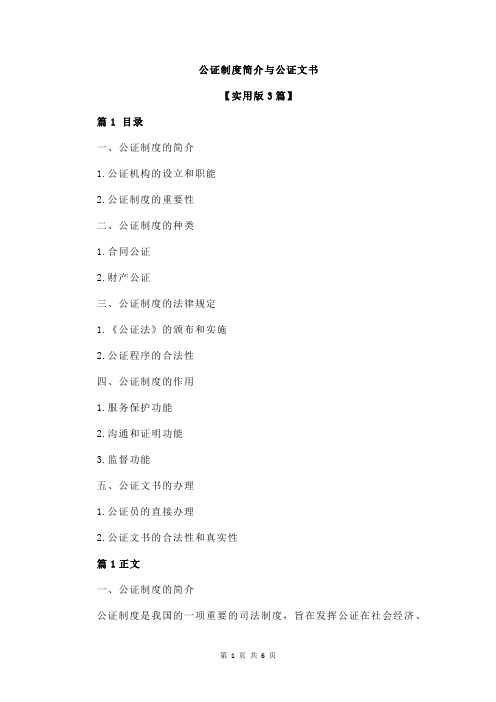
公证制度简介与公证文书【实用版3篇】篇1 目录一、公证制度的简介1.公证机构的设立和职能2.公证制度的重要性二、公证制度的种类1.合同公证2.财产公证三、公证制度的法律规定1.《公证法》的颁布和实施2.公证程序的合法性四、公证制度的作用1.服务保护功能2.沟通和证明功能3.监督功能五、公证文书的办理1.公证员的直接办理2.公证文书的合法性和真实性篇1正文一、公证制度的简介公证制度是我国的一项重要的司法制度,旨在发挥公证在社会经济、民事活动中的服务、沟通、证明、监督作用,预防纠纷,减少诉讼,促进社会安定和社会主义市场经济的发展。
公证机构是国家专门设立的、依法行使国家公证职权,代表国家办理公证事务、进行公证证明活动的司法证明机构。
根据《公证法》(2005 年 8 月 28 日第十届全国人大常委会第十七次会议通过,自 2006 年 3 月 1 日起施行),我国公证制度的各方面,如公证机构、公证员、公证程序、公证效力、法律责任等,都作了明确的规定。
二、公证制度的种类公证制度主要包括以下几种类型:1.合同公证:指当事人依法签订的协议或合同,经过公证机构或公证员证明后,可以确保其合法性和有效性。
2.财产公证:指财产权属、账户余额、债权债务等内容的公正,可以有力保护当事人的权益。
三、公证制度的法律规定为了规范公证活动,我国颁布了《公证法》,明确了公证机构的设立、公证员的资格条件和职责、公证程序、公证效力等方面的内容。
公证机构办理公证,必须由公证员直接办理,以确保公证文书的合法性和真实性。
四、公证制度的作用公证制度在社会经济、民事活动中具有重要的作用,主要包括以下几个方面:1.服务保护功能:公证机构是最先参与社会民事、经济活动,为公民和法人提供法律服务和法律保护的法律部门。
通过公证活动,帮助、指导公民、法人依法设立、变更法律行为,衡平当事人之间的关系,剔除纠纷隐患和不真实、不合法的因素,促进法律行为的履行。
2.沟通和证明功能:公证制度有助于沟通当事人之间的法律关系,确保法律行为的真实性和合法性。
论国家司法制度中的公证制度

论国家司法制度中的公证制度随着现代社会的发展,人们对司法制度的要求越来越高,其中公证制度则成为了国家司法制度不可或缺的组成部分。
公证制度的出现旨在保护个人和企业的合法权益,它的重要性在今天社会中更加得到了广泛的认可。
本文将从以下几个方面进行探讨:公证制度的概念、公证制度的作用、公证制度的类型及其适用范围、以及公证制度的局限性。
一、公证制度的概念公证制度是指由国家授权的公证机构对个人、企业和组织等民事行为的真实性、合法性和效力进行确认并提供证明的活动。
公证机构在执行公证活动时,需依据法律法规及相关政策对申请公证的文书、证据等材料进行审核,确保其真实性、合法性和有效性。
公证机构的公证行为具有法律效力,是保障当事人权益的重要手段。
二、公证制度的作用1.保障个人、企业和组织的合法权益公证机构在承担公证工作时,可以对文书、证据等材料进行审核并确认真实有效性,从而保护个人和企业等法人的合法权益。
例如,在买房、签订合同、办理遗产继承等方面,公证机构可以为申请人提供合法有效的证明,保障其权益受到合法保护。
2.促进社会诚信体系的建设公证制度在执行的同时,也促进了社会诚信体系的建设。
公证机构依法审核和确认文书、证据等材料的真实性和有效性,起到了审核、鉴定的作用。
这有助于减少和防止信息失信行为的发生,促进社会的诚信体系建设。
3.加强司法独立性的维护公证制度的存在,一方面强化了法律体系中各司法机关之间的配合与监督,另一方面,公证机构的独立性和公正性则加强了司法独立性的维护,保障了司法的公正性和权威性。
三、公证制度的类型及其适用范围公证制度根据不同的审查内容和公证对象不同,分为财产权利的公证、公证认证和公证承认三种形式。
1.财产权利的公证财产权利的公证主要指财产权的证明和变更,主要适用于房地产的买卖、房屋抵押、土地使用权等方面。
2.公证认证公证认证主要指对国际公约的承认证明、对收据和存款簿等证明存款的真实性以及某些人事证明例如学历证明等的确认。
中国的公证制度介绍

中国的公证制度介绍什么是公证公证是由法定的公证机构或者公证员依据法律规定,对当事人的意思表示和事实证明进行审查,发出具有法律效力的证明文件,以达到保障公民合法权益,维护社会公共利益的目的。
中国的公证制度起源于公元前221年的秦朝,历经多朝多代的演变和完善,至今已经成为我国法律体系中不可或缺的重要组成部分。
公证制度的主要职能中国的公证制度主要包括司法公证、行政公证和民事公证。
其职能主要体现在以下几个方面:审查委托人真实意思的证明公证机构和公证员通过对当事人的意思表示进行审查,保障委托人和交易对方的合法权益。
证明法律事实公证机构和公证员对法律事实进行证明,为法律的实施提供证据依据。
提供法律保障公证机构和公证员发出的证明文件具有法律效力,保障当事人的权利和义务得到有效维护和实现。
维护社会公共利益公证机构和公证员通过审核、验真、证明等手段,对不符合法律规定的违法行为进行制约和打击,维护社会公共利益和社会治安秩序的稳定。
公证的申请流程在中国,公证机构和公证员是由司法部门、公证协会和公证处管理的。
当人们需要办理公证时,需要按照以下步骤进行:1.预约办理公证;2.缴纳公证费用;3.提供有效证明材料;4.公证员进行审查和核实;5.发出具有法律效力的证明文件。
公证的办理流程简单,步骤明确,便于公民和企业进行申请和办理。
注意事项在中国,进行公证时需要注意以下事项:1.公证材料必须真实、完整;2.公证材料必须与委托人身份证明相符;3.公证事项必须符合法律规定;4.公证机构和公证员行为必须合法规范;5.公证费用必须合理公开。
在办理公证时,当事人需要特别注意以上事项,以确保公证的有效性和真实性。
公证制度的作用公证制度是我国法律制度中不可或缺的重要组成部分。
除了凸显法治社会的运转机制,公证制度还具有以下几个作用:1.保障合法权益公证机构对委托人和交易对方的权利和义务进行审查和证明,保障合法权益得到维护和实现。
2.提高交易效率公证机构和公证员对交易事项进行证明,在保障公证真实可靠的基础上,提高了交易的效率。
试论国家司法制度中的公证制度

试论国家司法制度中的公证制度公证制度是国家司法制度中的一个重要组成部分,旨在保障公民合法权益、维护社会公平正义。
公证制度具有广泛适用性和普遍适用性,对于民事、商事、刑事等各个领域都具有重要意义。
本文将从公证制度的定义、历史演变、功能与价值等方面进行详细阐述。
首先,公证制度是指由国家指定的具备法律资格的公证员依法进行的证明、鉴定和监督等操作的一种制度。
公证制度的核心特点是公证员的介入和证明的法律效力。
公证员作为第三方中立的权威机构,通过公正行为的实施,为当事人提供法律保证,提高了法律行为的可靠性和公信力。
公证制度的历史可以追溯到古代社会。
在我国古代,民间有“任副使传印信,不用尔问问”的传统。
而公证制度在现代法律体系中的确立可以追溯到法国大革命时期,当时法国社会出现了各种严重的社会问题,为了解决这些问题,彻底司法体系成为迫切要求。
于是,法国于1791年颁布了《公证法》正式确立了公证制度,成为公证制度的起源地。
接着,公证制度被逐渐引入其他国家,成为世界各国司法制度的一部分。
公证制度具有诸多功能与价值。
首先,公证制度有助于维护公民的合法权益。
公证员作为公证行为的实施主体,可以对各类法律事务进行证明、鉴定和记录,减少法律纠纷的发生。
其次,公证制度有助于提高法律行为的效力。
公证制度赋予了公证文书的法律效力,对公众和行政机关是具有强制性质的。
再次,公证制度有助于增加合同的可信度。
公证员作为中立的第三方,在合同签订过程中对合同内容进行核查和证明,进一步增加了合同的可靠性。
此外,公证制度还有助于维护社会公平正义。
公证员的介入可以提高司法公正度,减少司法差错,确保社会公平正义的实现。
然而,公证制度仍然存在一些问题和争议。
首先,公证制度的法律体系相对较为复杂,存在一定的操作风险。
其次,公证费用较高,给部分人群带来了一定的经济负担。
再次,公证员的专业素质和道德水平参差不齐,有一定的监管缺失。
此外,在一些具有特殊性质的案件中,如刑事案件,公证制度的适用性有时存在一定的问题。
公证制度的法律规定(3篇)
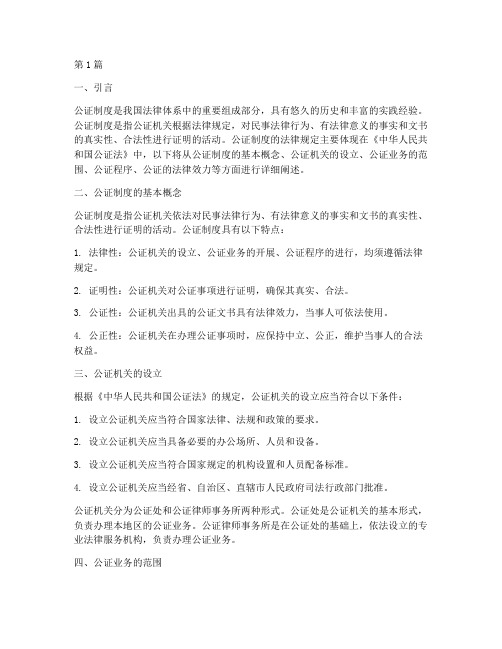
第1篇一、引言公证制度是我国法律体系中的重要组成部分,具有悠久的历史和丰富的实践经验。
公证制度是指公证机关根据法律规定,对民事法律行为、有法律意义的事实和文书的真实性、合法性进行证明的活动。
公证制度的法律规定主要体现在《中华人民共和国公证法》中,以下将从公证制度的基本概念、公证机关的设立、公证业务的范围、公证程序、公证的法律效力等方面进行详细阐述。
二、公证制度的基本概念公证制度是指公证机关依法对民事法律行为、有法律意义的事实和文书的真实性、合法性进行证明的活动。
公证制度具有以下特点:1. 法律性:公证机关的设立、公证业务的开展、公证程序的进行,均须遵循法律规定。
2. 证明性:公证机关对公证事项进行证明,确保其真实、合法。
3. 公证性:公证机关出具的公证文书具有法律效力,当事人可依法使用。
4. 公正性:公证机关在办理公证事项时,应保持中立、公正,维护当事人的合法权益。
三、公证机关的设立根据《中华人民共和国公证法》的规定,公证机关的设立应当符合以下条件:1. 设立公证机关应当符合国家法律、法规和政策的要求。
2. 设立公证机关应当具备必要的办公场所、人员和设备。
3. 设立公证机关应当符合国家规定的机构设置和人员配备标准。
4. 设立公证机关应当经省、自治区、直辖市人民政府司法行政部门批准。
公证机关分为公证处和公证律师事务所两种形式。
公证处是公证机关的基本形式,负责办理本地区的公证业务。
公证律师事务所是在公证处的基础上,依法设立的专业法律服务机构,负责办理公证业务。
四、公证业务的范围公证业务的范围主要包括以下方面:1. 民事法律行为公证:包括合同、遗嘱、委托、赠与、收养、继承、监护、财产分割、商标注册、专利申请等。
2. 有法律意义的事实公证:包括婚姻、出生、死亡、学历、职称、任职、亲属关系、收养、亲属财产分割等。
3. 文书公证:包括各种证明、鉴定、评估、登记、备案等法律文书的公证。
4. 证明法律事实:包括证明当事人身份、证明当事人资格、证明当事人权利义务等。
中国公证制度
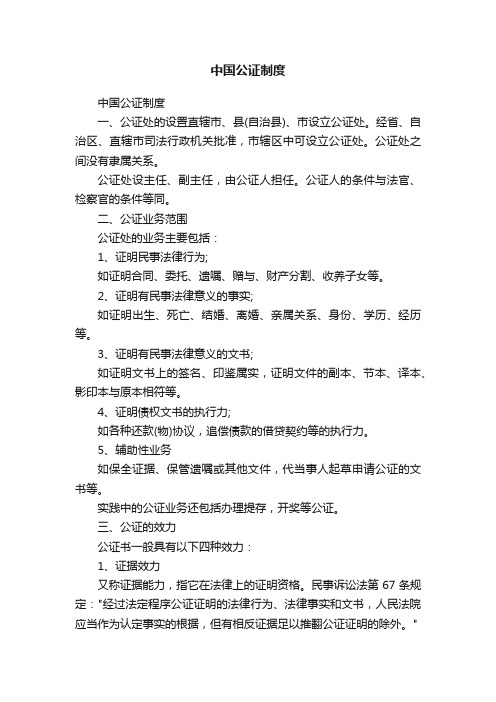
中国公证制度中国公证制度一、公证处的设置直辖市、县(自治县)、市设立公证处。
经省、自治区、直辖市司法行政机关批准,市辖区中可设立公证处。
公证处之间没有隶属关系。
公证处设主任、副主任,由公证人担任。
公证人的条件与法官、检察官的条件等同。
二、公证业务范围公证处的业务主要包括:1、证明民事法律行为;如证明合同、委托、遗嘱、赠与、财产分割、收养子女等。
2、证明有民事法律意义的事实;如证明出生、死亡、结婚、离婚、亲属关系、身份、学历、经历等。
3、证明有民事法律意义的文书;如证明文书上的签名、印鉴属实,证明文件的副本、节本、译本、影印本与原本相符等。
4、证明债权文书的执行力;如各种还款(物)协议,追偿债款的借贷契约等的执行力。
5、辅助性业务如保全证据、保管遗嘱或其他文件,代当事人起草申请公证的文书等。
实践中的公证业务还包括办理提存,开奖等公证。
三、公证的效力公证书一般具有以下四种效力:1、证据效力又称证据能力,指它在法律上的证明资格。
民事诉讼法第67条规定:"经过法定程序公证证明的法律行为、法律事实和文书,人民法院应当作为认定事实的根据,但有相反证据足以推翻公证证明的除外。
"2、执行效力公证书的执行效力,是指它的强制执行力,目前仅限于认为无异议的追偿债款、物品的债权文书,并非所有文书。
经过公证处证明有强制执行效力的债权文书,一方当事人不按文书规定履行时,对方当事人可以向有管辖权的基层人民法院申请执行。
3、法律效力公证书的法律效力是指某些法律行为只有经过公证证明后才成立生效,才具有法律约束力,才受到国家的保护。
如收养子女,中国公民同外国人办理婚姻登记等行为。
4、域外效力即公证书在域外使用时发生法律上的效力。
这是公证书本身所固有的法律上的效力和作用在域外的延伸。
按照国际惯例,中国公民或法人发往域外使用的文书,经公证机关证明后,还须经外交部和各省、市、自治区外事办公室或外国驻华使、领馆的认证,才能在国外发生法律上的效力,取得使用国的`承认。
- 1、下载文档前请自行甄别文档内容的完整性,平台不提供额外的编辑、内容补充、找答案等附加服务。
- 2、"仅部分预览"的文档,不可在线预览部分如存在完整性等问题,可反馈申请退款(可完整预览的文档不适用该条件!)。
- 3、如文档侵犯您的权益,请联系客服反馈,我们会尽快为您处理(人工客服工作时间:9:00-18:30)。
中国公证制度介绍Public Notary Systemfrom:Public notaries are persons accredited by thestate to witness civil matters for legal purposes. In the past, public notaries were state offices representing the state in witnessing legal relationsin civil matters. State notary offices, at the request of applicants, notarize legal acts and thetruthfulness and legality of legal documents and facts in order to protect public property and safeguard the lawful rights and interests of citizens. Since October 1, xx, the Ministry of Justice has implemented a plan to reform the notary system. Under the new scheme, public notary offices are no longer administrative bodies; rather, they are non-profit entities with a legal-person status that independently conduct notary business to meet market demand and assume full responsibility for their operations. In the future,the state will no longer approve the establishment of public notary offices as administrative bodies. Public notaries will be recruited openly through examinations administered by the Ministry of Justice.Setup of Public Notary OfficesPublic notary offices are set up in municipalities directly under the central government, counties (autonomous counties), and cities. Subject to approval from judicial authorities of provinces, autonomous regions and municipalities, districts of cities may also set up public notary offices. All the offices are independent of each other.Each office should have a director and a deputy director who should be notaries themselves.Scope of Business· Notarize civil legal acts such as contracts, trusts, wills, gifts, division of property, and adoption of children;· Notarize facts that amount to civil legal acts such as birth, death, marriage, divorce, kinship, identity, degree, and experience;· Notarize documents that amount to civil legal acts such as authenticity of signatures and seals on certificates, consistency of copies of certificates, excerpts, translations and photocopies with the originals;· Notarize the enforceability of creditor documents such as repayment agreements and contracts on recovery of debts;· Auxiliary business, such as preservation of evidence, maintenance of wills or other documents, drafting notary documents on behalf of clients, notarizing the opening of lottery draws, etc.Validity of ContractsNotarized documents are good for the followingfour purposes:· Evidence. Article 67 of the Civil Procedure Law states, "Legal acts, legal facts and documents that have been notarized through legal procedures should be regarded as a basis for establishing facts, except where opposing evidence is sufficient to overrule the notarized documents."· Enforceability. At present, this is limited only to the recovery of debts and goods. Liability documents notarized by public notaries are enforceable; if one party fails to comply, the other party can apply to the local grassroots court that has jurisdiction for enforcement.· Legality. This means certain legal acts take effect and become legally binding only after they are notarized. These include adoption of children and marriage registration between Chinese citizens and foreigners.· Extraterritoriality. Notarized documents are legally valid outside China. This is an extension of the inherent legal effect of notarized documents abroad. According to international practice, notarized documents sent by Chinese citizens and legal entities for use abroad can take legal effect and be accepted by the host country only after they are certified by the Chinese Foreign Ministry and Foreign Affairs Offices of the provinces, autonomous regions andmunicipalities or foreign embassies or consulates in China.ProceduresPublic notary offices and persons applying for notarization should observe the following procedures:1. Application and Acceptance of ApplicationsExcept for wills and adoption, which require the applicant to go to the public notary office in person, citizens or legal persons can authorize an agent to handle the notarization procedures on their behalf. Applications should be filed with a public notary office that has jurisdiction and an application form should be filled out and be affixed with a signature or seal. Applications should come with other supporting documentation such as ID, letter of authorization, documents to be notarized, property ownership certificates or other materials. The public notary office should make a preliminary decision whether to accept the application or not upon receipt of application documents.2. ReviewAn important link in notarization, public notaries should carefully review the number of applicants, identity, qualifications, capability of civil acts, intentions of applicants and applicable rights. They should also verify whether the acts, facts or documents to be notarized are true and legal, whether the documents to be notarized are complete, whether the wording is accurate, and whether the signature or seal is complete.3. CertificationPublic notaries should produce a public notary certificate for qualified applicants.4. Special ProceduresThese refer to procedures required for special types of public notarization, such as tendering and bidding, opening of lottery draws and auction bids. In such cases, public notaries should be at the scene themselves and read a public notary statement regarding what is truthful and legal. Furthermore, they should produce a notary document and deliver it to applicants within seven days of notarization.5. ReconsiderationApplicants who object to decisions given by a public notary office not to accept an application, refuse to notarize or withdraw a public notary document may apply within a specified period of time to the judicial authorities for reconsideration; those who object to the reconsideration decision may file a suit to a court of law within the specified period of time.。
